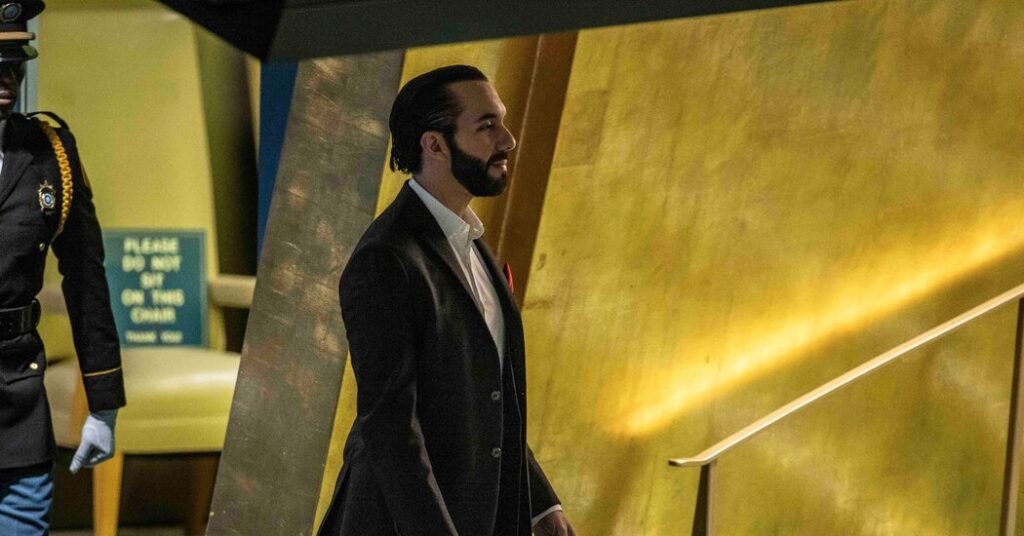In El Salvador’s presidential race on Sunday, there is no real competition: Nayib Bukele, the millennial president who reshaped the country by cracking down on gangs and civil liberties, is expected to win re-election in a landslide.
Legal scholars say Mr. Bukele, 42, is violating a constitutional ban by seeking a second consecutive term, but most Salvadorans seem unconcerned.
Polls show voters overwhelmingly support Mr Bukele’s candidacy and are likely to cement his party’s supermajority in the legislature on Sunday, extending the leader’s unfettered control over every lever of government for years.
“They want to show they can do this, they want to show they have the popular support to do it — and they want everyone to live with it, regardless of the Constitution,” said Ricardo Zuniga, who served as U.S. Secretary of State . special envoy to Central America under President Biden. “It’s a show of strength.”
Nearly 80 percent of Salvadorans said they supported Mr. Bukele’s candidacy in a recent survey. The same survey shows his New Ideas party could win as many as 57 of the 60 seats in the legislature after making changes to the composition of the legislative assembly that analysts say benefited the ruling party.
Mr Bukele’s main selling point was the nearly two-year state of emergency imposed by his government after a March 2022 killing spree by gangs that had long dominated the streets.
Authorities have arrested around 75,000 people since then, without due process, and have put basic constitutional rights on hold indefinitely.
But the result was undeniable. The three gangs that made the country one of the most violent places on earth have lost all semblance of power.
“The main pillar on which he has built his popular support is what the government has done for security,” said Omar Serrano, vice chancellor for social outreach at the University of Central America José Simeón Cañas. “Emergency is what people value most.”
Mr. Bukele, the scion of a family of Palestinian immigrants who arrived in Central America in the early 20th century, was one of eight siblings and half-siblings who grew up in Escalón, an upper-middle-class neighborhood in San Salvador, the capital. He studied at an elite, bilingual high school.
After working as a journalist on political campaigns, Mr Bukele moved into politics in 2011 and quickly rose to prominence. At the age of 30, he became mayor of Nuevo Cuscatlan, a small town on the outskirts of San Salvador, representing the far-left party Farabundo Martí National Liberation Front, or FMLN.
Three years later, he became mayor of San Salvador, a position considered a stepping stone to the presidency. Ahead of the 2019 presidential election, he formed his own New Ideas party, but ran as the candidate of a small right-wing party, GANA, in order to meet the legal requirements to contest. He sailed to victory vowing to break with the corrupt politics of the past.
Once in office, however, he turned to tactics that many saw as a return to the authoritarian leadership for which the country had fought a 12-year civil war.
He marched troops into the legislature to pressure lawmakers to approve government funding and later replaced an attorney general who was investigating corruption in his administration.
In 2021, after winning a supermajority in Congress, his party replaced chief justices at the Supreme Court, who within months reinterpreted the Constitution to allow Mr Bukele to compete for the presidency again.
However, his appeal has hardly wavered at home and among a remarkable group of fans across the hemisphere. Politicians from Colombia to Ecuador have vowed to emulate him.
Erlinda Vela Gutiérrez, who runs a stall selling choche in a San Salvador market, said she had been inundated with tourists asking for paraphernalia with the face of the man she called “my beloved president”. It has magnets, mugs, key chains and figurines.
Ms. Vela Gutiérrez, who lives in Las Margaritas, a neighborhood outside San Salvador that was once a stronghold of the rogue MS-13 gang, said she was not concerned if Mr. Bukele was breaking democratic rules.
“If he runs for president 10 times, I’ll take him 10 times,” he said. Already, she said, she has sent her family in Maryland a batch of “hats, T-shirts, jackets, just Bukele.”
This election will be the first time Salvadorans living abroad vote en masse after the government allowed advance voting on an app, a move analysts say was designed to take advantage of Mr. Bukele’s popularity among those who immigrated to the United States.
More than 140,000 Salvadorans abroad have already voted, compared to fewer than 4,000 in the last election, five years ago. Voter turnout has increased in states with large Salvadoran communities, such as Virginia, California and New York.
The five opposition candidates for president have gained almost no traction in the polls, including contenders from the right-wing Arena party and the left-wing FMLN party, which has dominated Salvadoran politics for 30 years.

